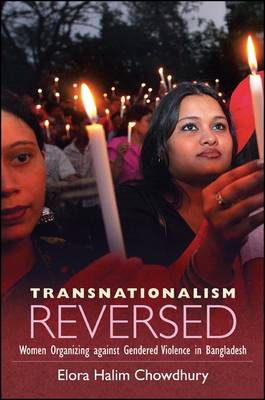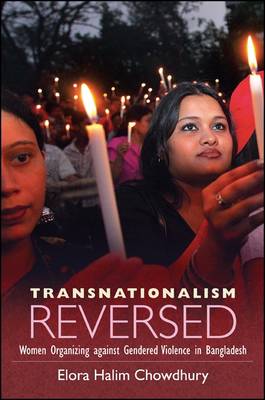
Door een staking bij bpost kan je online bestelling op dit moment iets langer onderweg zijn dan voorzien. Dringend iets nodig? Onze winkels ontvangen jou met open armen!
- Afhalen na 1 uur in een winkel met voorraad
- Gratis thuislevering in België vanaf € 30
- Ruim aanbod met 7 miljoen producten
Door een staking bij bpost kan je online bestelling op dit moment iets langer onderweg zijn dan voorzien. Dringend iets nodig? Onze winkels ontvangen jou met open armen!
- Afhalen na 1 uur in een winkel met voorraad
- Gratis thuislevering in België vanaf € 30
- Ruim aanbod met 7 miljoen producten
Zoeken
Transnationalism Reversed
Women Organizing Against Gendered Violence in Bangladesh
Elora Halim Chowdhury
€ 53,45
+ 106 punten
Omschrijving
Winner of the 2012 Gloria E. Anzaldua Book Prize presented by the National Women's Studies Association
Acid attacks against women and girls have captured the attention of the global media, with several high-profile reports ranging from the BBC to The Oprah Winfrey Show. In Bangladesh, reasons for the attacks include women's rejection of sexual advances from men, refusal of marriage proposals, family or land disputes, and unmet dowry demands. The consequences are multiple: permanent marks on the body, disfiguration, and potential blindness. In Transnationalism Reversed, Elora Halim Chowdhury explores the complicated terrain of women's transnational antiviolence organizing by focusing on the work done in Bangladesh around acid attacks--and the ways in which the state, international agencies, local expatriates, US media, Bangladeshi immigrants in the United States, survivor-activists, and local women's organizations engage the pragmatics and the transnational rhetoric of empowerment, rescue, and rehabilitation. Grounded in careful ethnographic work, oral history, and theoretical and filmic analysis, Transnationalism Reversed makes a significant contribution to conversations around gendered violence, transnational feminist praxis, and the politics of organizing--particularly around NGOs--in the global South.
Acid attacks against women and girls have captured the attention of the global media, with several high-profile reports ranging from the BBC to The Oprah Winfrey Show. In Bangladesh, reasons for the attacks include women's rejection of sexual advances from men, refusal of marriage proposals, family or land disputes, and unmet dowry demands. The consequences are multiple: permanent marks on the body, disfiguration, and potential blindness. In Transnationalism Reversed, Elora Halim Chowdhury explores the complicated terrain of women's transnational antiviolence organizing by focusing on the work done in Bangladesh around acid attacks--and the ways in which the state, international agencies, local expatriates, US media, Bangladeshi immigrants in the United States, survivor-activists, and local women's organizations engage the pragmatics and the transnational rhetoric of empowerment, rescue, and rehabilitation. Grounded in careful ethnographic work, oral history, and theoretical and filmic analysis, Transnationalism Reversed makes a significant contribution to conversations around gendered violence, transnational feminist praxis, and the politics of organizing--particularly around NGOs--in the global South.
Specificaties
Betrokkenen
- Auteur(s):
- Uitgeverij:
Inhoud
- Aantal bladzijden:
- 242
- Taal:
- Engels
- Reeks:
Eigenschappen
- Productcode (EAN):
- 9781438437521
- Verschijningsdatum:
- 1/10/2011
- Uitvoering:
- Paperback
- Formaat:
- Trade paperback (VS)
- Afmetingen:
- 152 mm x 226 mm
- Gewicht:
- 340 g

Alleen bij Standaard Boekhandel
+ 106 punten op je klantenkaart van Standaard Boekhandel
Beoordelingen
We publiceren alleen reviews die voldoen aan de voorwaarden voor reviews. Bekijk onze voorwaarden voor reviews.











